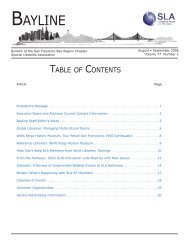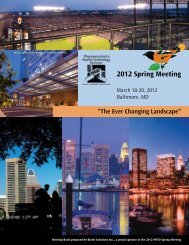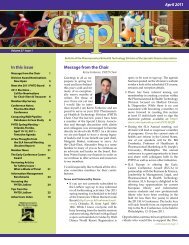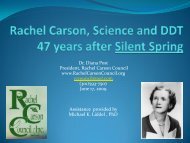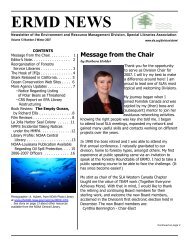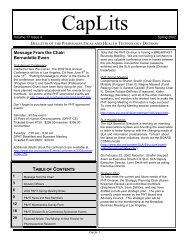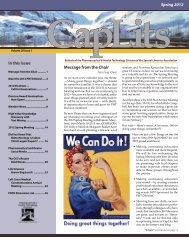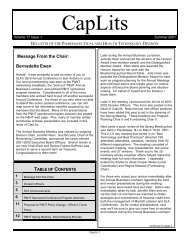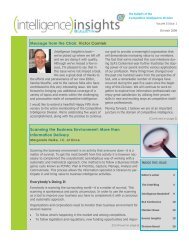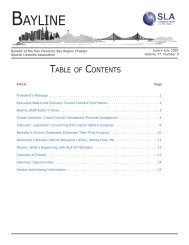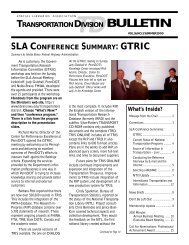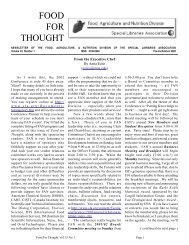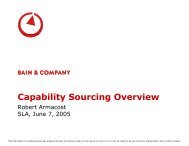SLA@iowa - units.sla.org
SLA@iowa - units.sla.org
SLA@iowa - units.sla.org
Create successful ePaper yourself
Turn your PDF publications into a flip-book with our unique Google optimized e-Paper software.
<strong>SLA@iowa</strong><br />
www.<strong>sla</strong>.<strong>org</strong> Iowa Chapter Bulletin December 2007<br />
President’s Message<br />
By Anna Marie Guengerich, SLA-Iowa President<br />
Iowa Library Association Conference 2007<br />
I attended ILA this year for this first time and<br />
had a great time— interesting sessions, good<br />
food, and a very nice bag! The Special Libraries Round Table<br />
sponsored a breakfast meeting where I met 2008 SLRT Chair Sheri<br />
Muller of Grand View College (Des Moines) and Vice Chair Matt<br />
Pannkuk of Buckle Down Publishing (Iowa City). Sheri and Matt are<br />
also members of our chapter, as were some of the other attendees at<br />
the breakfast. I definitely see the benefits of joining both ILA and SLA.<br />
Dinner with Stephen Abram<br />
Another great thing about the ILA conference was meeting SLA<br />
President-Elect Stephen Abram, where he presented a keynote and<br />
also another session. Stephen is energetic, engaging, entertaining; we<br />
are fortunate to have him as our incoming SLA president. If you ever<br />
think to yourself, ―I‘m a ‗sweater set‘ librarian and all this new stuff is too<br />
much to learn,‖ he will lead you through a complete makeover, quickly<br />
and with encouragement that you CAN do it. Check out his column from<br />
Information Outlook, Feb. 2007, issue: ―15 Minutes a Day: A Personal<br />
Learning Management Strategy.‖<br />
Inside <strong>SLA@iowa</strong><br />
Editor’s Corner, p. 2<br />
Kay’s Concise Report on<br />
Denver, p. 3<br />
Fall Meeting Highlights, p. 4<br />
Member News, p. 4<br />
Library in the Limelight:<br />
Emerson Process Management<br />
Information Center, p. 5<br />
Scholarship Recipient’s<br />
Winning Essay, p. 7<br />
New Members, p. 8<br />
Conference Report: Digital<br />
Assets Management, p. 9<br />
Conference Report: Internet<br />
Librarian 2007, p. 10<br />
Newly Elected Executive<br />
Board, p. 11<br />
Calendar, p. 12<br />
Stephen recently initiated a Call for Volunteers with plans to build a<br />
database of members interested in working with fellow information specialists from all over the world.<br />
Read more about it and think about filling out the volunteer form, too:<br />
http://www.<strong>sla</strong>.<strong>org</strong>/content/community/committe/volunteer.cfm<br />
If you want to test out volunteering by first dipping your toes into a local lake rather than a global ocean,<br />
our Iowa Chapter would love to have you join one of our committees.<br />
In spite of his crazy travel schedule, and picking up a nasty cold/flu bug along the way, Stephen rallied<br />
to meet with us for dinner Friday night. A noisy, pregame Hawkeye football crowd filled Mondo‘s<br />
Restaurant and we had to shout at one another to be heard, but it was still great to meet Stephen in<br />
person. We were happy to have SLIS represented by Prof. Patricia Katopol, and students Laurie Aude<br />
and Elizabeth Galvez and her husband. Other guests were Dave Martin, Dan Daly, Matt Pannkuk,<br />
Jamie Hosek, and Jacqueline Snider and her husband. Thanks to all for coming. We hope you enjoyed<br />
<br />
Happy<br />
Holidays!<br />
<br />
(Continued on page 3)
Editor’s Corner<br />
By Susan Lerdal, <strong>SLA@iowa</strong> Editor<br />
Some interesting things I‘ve read or viewed<br />
lately:<br />
Top 7 Alternatives to Wikipedia<br />
http://oedb.<strong>org</strong>/library/features/top-7-alternatives-towikipedia<br />
Wikipedia is one of the most popular Web sites<br />
in the world, but it is vulnerable to many<br />
problems. If you are looking for a different kind<br />
of online encyclopedia, check out the seven<br />
alternatives to Wikipedia featured in this article.<br />
A Vision of Students Today<br />
http://www.youtube.com/watch?v=dGCJ46vyR9o<br />
A short video summarizing some of the most<br />
important characteristics of students today—<br />
how they learn, what they need to learn, their<br />
goals, hopes, dreams, what their lives will be<br />
like, and what kinds of changes they will<br />
experience in their lifetime. Created by Michael<br />
Wesch in collaboration with 200 students at<br />
Kansas State University.<br />
The Machine is Us/ing Us (Final Version)<br />
http://www.youtube.com/watch?v=NLlGopyXT_g<br />
"Web 2.0" in just under 5 minutes. Created by<br />
Michael Wesch at Kansas State University.<br />
World Digital Library<br />
http://www.worlddigitallibrary.<strong>org</strong>/project/english/inde<br />
x.html<br />
―The World Digital Library will make available on<br />
the Internet, free of charge and in multilingual<br />
format, significant primary materials from<br />
cultures around the world, including<br />
manuscripts, maps, rare books, musical scores,<br />
recordings, films, prints, photographs,<br />
architectural drawings, and other significant<br />
cultural materials. The objectives of the World<br />
Digital Library are to promote international and<br />
inter-cultural understanding and awareness,<br />
provide resources to educators, expand non-<br />
English and non-Western content on the<br />
Internet, and to contribute to scholarly research.‖<br />
2<br />
SLA-Iowa Executive Board<br />
Anna Guengerich, President<br />
Iowa Testing Programs, University of Iowa<br />
Iowa City<br />
anna-guengerich@uiowa.edu<br />
Kay Kelly, President-Elect<br />
Principal Financial Group, Corporate Library<br />
Des Moines<br />
kelly.kay@principal.com<br />
Kenneth Braun, Secretary<br />
Library Resources, Pioneer Hi-Bred<br />
International, Inc.<br />
Des Moines<br />
ken.braun@pioneer.com<br />
Isabela Varela, Treasurer<br />
Academic Advising & Career Services<br />
University of Northern Iowa<br />
Cedar Falls<br />
isabela.varela@uni.edu<br />
Brent Chesson, Past President<br />
Principal Financial Group, Law Library<br />
Des Moines<br />
chesson.brent@principal.com<br />
<strong>SLA@iowa</strong>, the bulletin of the Iowa Chapter of SLA,<br />
is published electronically twice a year following the<br />
chapter’s biannual meetings. The publication is free<br />
and available at the chapter’s Web site:<br />
http://www.<strong>sla</strong>.<strong>org</strong>/chapter/cio/cio.htm .<br />
Contact Editor Susan Lerdal at:<br />
susan.lerdal@drake.edu<br />
SLA assumes no responsibility for the statements<br />
and opinions advanced by contributors to the<br />
association’s publications. Editorial views do not<br />
necessarily represent the official position of SLA.<br />
The <strong>SLA@iowa</strong> logo was designed by Kristin Price,<br />
who holds a B.A. in advertising from graduate of<br />
Iowa State University‘s Greenlee School of<br />
Journalism and Communication.
President’s Message<br />
(Continued from page 1)<br />
your first trip to Iowa, Stephen. You have inspired me to get rid of some sweater set notions hanging in<br />
my mental closet. Some of my real sweater sets have got to go, too. I counted and I have too many.<br />
Thank you!<br />
My term as President ends December, 2007, and this is my final President‘s message. I am very<br />
pleased we were able to again offer our scholarship this year, a significant accomplishment for our<br />
small chapter. Tara was a fantastic representative for SLA-Iowa at the SLA conference.<br />
Other recent highlights for our chapter include:<br />
SLIS Professor Patricia Katopol joined our chapter. With her guidance and enthusiasm for SLA,<br />
we hope a student chapter will form.<br />
Executive Board voted to give a donation to SLA‘s Diversity Committee.<br />
We have become better acquainted with State Librarian Mary Wegner; she is a great advocate<br />
for all libraries in Iowa. Thank you, Mary, for coming to our spring meetings in Des Moines and<br />
giving us an annual update.<br />
Meg Boulton and Kim Bloedel recently volunteered to take the positions of Membership Chair<br />
and Webmaster respectively.<br />
I am very grateful to the members of the Executive Board and Advisory Council who made the above<br />
things happen, as well as all the other activities during my term. They all have lots to do in their work<br />
lives and personal lives, yet each of these people managed to find the time to volunteer for our chapter.<br />
SLA Conference<br />
Denver, June 2007<br />
By President-Elect Kay Kelly<br />
Networking was great, sessions were terrific, and the shopping – that<br />
was wonderful! I purposely book a hotel that‘s convenient to shopping<br />
whenever possible. Not only does it provide fun people watching, but it<br />
usually gives me a reason to get in some walking. Exercise wasn‘t a<br />
problem in Denver since the Convention Center alone includes 2.2<br />
million square feet of convention and meeting space. Can‘t say that I<br />
walked every square foot, but I did decide the 40 foot blue bear that<br />
continuously stares into the Convention Center must have gotten a kick<br />
out of watching hundreds of conference weary librarians pass by each<br />
day.<br />
Editor’s Note: SLA 2007 Contributed Papers and Presentations are available<br />
at: http://www.<strong>sla</strong>.<strong>org</strong>/content/Events/conference/ac2007/conference/papers.cfm<br />
3
Fall Meeting Highlights<br />
By Anna Marie Guengerich, SLA-Iowa President<br />
Wow! — That‘s my reaction to the great turnout we had for our annual fall meeting. A big ―Thank You‖<br />
to Program Chair Dave Martin for <strong>org</strong>anizing this day for us, and to Student/Academic Relations Chair<br />
Jacqueline Snider for promoting the meeting to SLIS. It was a pleasure to meet 2007 scholarship<br />
recipient Tara Marsh, along with the other SLIS students who attended. Thank you for your interest in<br />
SLA.<br />
Also many thanks to our presenters:<br />
Panel – Careers in Special Librarianship: Tara Marsh reported on her experiences at SLA 2007 in<br />
Denver and the benefits of SLA in her workplace; SLIS Professor Patricia Katopol reflected on her own<br />
career path and interest in knowledge management; and Joel Berger, President of library consulting<br />
and staffing firm C. Berger Group, Inc., spoke about the current job market and making the most of your<br />
MLS.<br />
http://slis.uiowa.edu/~slisweb/index.php?section=f&page=faculty/profiles.html<br />
http://cberger.com<br />
SLIS Student Miriam Sweeney introduced us to Second Life, a social<br />
networking 3-D virtual world. Miriam is a reference librarian in SL— what<br />
does she do??? She does what any librarian does at the reference desk—<br />
answers questions, about real life and SL.<br />
http://secondlife.com/<br />
IM Masha Brendel in SL<br />
4<br />
Wow!<br />
Ed Holtum made us all shudder a bit, and glad that we did not get sick long ago. Ed<br />
curates the John Martin Rare Book Room at University of Iowa‘s health sciences library, a nearly 5,000<br />
volume collection of rare classics in medicine of the 15th through 20th centuries. Vivid interactive slides<br />
and video clip interviews with the late Dr. Martin gave us a glimpse into the great intellect and<br />
inquisitiveness of scientists who brought about understanding of the human body, all without MRI scans<br />
and lab tests. Ed brought some actual pieces for us to look at and you can also see the digitized<br />
collection online.<br />
http://www.lib.uiowa.edu/hardin/rbr/<br />
Member News<br />
Suzanne Corriell, recipient of the 2006 SLA-Iowa scholarship, has accepted a position as the<br />
Research and Reference Services Librarian at the University of Richmond School of Law in Richmond,<br />
Virginia, effective August 1, 2007.<br />
Susan Lerdal, Drake University Law Library Reference Librarian, recently presented a session entitled<br />
Sound Research or Seat of Your Pants: Should Law Librarians Conduct Empirical Research? at the<br />
annual meeting of the Mid America Association of Law Libraries in Lincoln, Nebraska.
Library in the Limelight:<br />
Emerson Process Management Information Center<br />
By Jennifer Raghavan, <strong>SLA@iowa</strong> Writer<br />
This edition of Library in the Limelight features Emerson Process Management Information Center,<br />
located in Marshalltown, Iowa. The Marshalltown information center works in collaboration with two<br />
other sister companies in the Emerson Process Management group—the Process Systems and<br />
Solutions eLibrary in Austin, Texas, and the Rosemount Engineering Library in Chanhassen,<br />
Minnesota. These three libraries make up the only libraries in the whole of Emerson Electric.<br />
I spoke with Brian Herman, who is Emerson‘s Information Center Analyst. Brian has been with<br />
Emerson Process Management for two years. Previously, Brian worked for Kutak Rock Law firm in<br />
Omaha, Ames Public<br />
Library, Skokie Public<br />
Library and Glenview<br />
Public Library in Illinois,<br />
Trinity Divinity School in<br />
Deerfield, Illinois, and<br />
Southeast Community<br />
College in Lincoln,<br />
Nebraska. He‘s been in<br />
the profession for<br />
approximately 17 years,<br />
functioning as reference<br />
librarian and researcher,<br />
cataloger, ILS manager,<br />
and paraprofessional.<br />
Brian earned his MALS<br />
from Rosary College (now<br />
Dominican University) in<br />
River Forest, Illinois, and<br />
has a BA in biblical studies.<br />
What is the history of your<br />
library?<br />
The library was started in<br />
October 1979. It consisted of<br />
a collection of books,<br />
Back Row (left to right): Mark Heindselman (Manager, Knowledge Network and<br />
Information Services); Herb Rickert (FISHWEB Content Webmaster); Brian<br />
Herman (Information Center Analyst); Jeremy Wilson (SharePoint<br />
Administrator)<br />
Front Row (left to right): Jamie Hosek (Information Center Assistant); Stacy<br />
Lorance (Content Management Analyst); Jan Otto (Content Management/Web<br />
Administrator); Barb Bereczki (Contract Employee)<br />
articles, patents, competitive product catalogs and with, at the time, a very high tech microfilm based<br />
product catalog system. Communication with online databases, which were new at the time, was with a<br />
Texas Instruments Silent 700 terminal that used thermal paper and had no video screen. The library<br />
grew and took on some additional responsibilities for managing internal engineering documentation. In<br />
1984 it moved to the current location which has about 4000 sq. ft. and was renamed the Fisher<br />
Controls Information Center.<br />
The current Information Center manages 40,000 internal proprietary reports, 10,000 patents, 20,000<br />
journal articles, 5000 books, 2000 audio/video, 300 directories, 5000 hard copy standards, and over<br />
150 active subscriptions. Besides the Information Center, less active documents and company records<br />
5<br />
(Continued on page 5)
Library in the Limelight<br />
(Continued from page 4)<br />
are held in another location called the Records Center. This facility contains over 43,000 sq. ft. of paper<br />
and microfilm business records from Fisher Controls business locations around North America. Boxes,<br />
cabinets, and file shelves of records are maintained both for permanent and dated storage intervals.<br />
Who are your users? Do you primarily deal with your users in-person or electronically?<br />
We serve engineers and business development people within our company. We deal with most<br />
requests via phone and email, but also take many requests in person from those who reside at or are<br />
visiting the Marshalltown office.<br />
What are some typical requests you field?<br />
We find specific documents (patents, standards, journal<br />
articles, conference proceedings, market studies, D&B<br />
company reports, SEC reports, etc.) and datasets<br />
(economic indicators, capacity numbers for plants in an<br />
industry sector, installed base [number of plants] for an<br />
industry sector, smoke stack lists [contact lists of industry<br />
specific factory locations], lists of industry specific project<br />
information, etc.) for our customers. We perform literature<br />
searches in technical and business development areas. We<br />
perform ongoing news delivery, specific to the interests of<br />
our company using various methodologies of delivery. We<br />
do investigative research for various new interests in<br />
technical and business development areas.<br />
What is the most challenging question you've been<br />
asked?<br />
Questions involving private companies in lesser-developed countries seem to be among the most<br />
challenging.<br />
How have your library and your role changed since you began your tenure?<br />
We remain as fluid as possible so that we can adapt to and meet the ever changing information needs<br />
of our company.<br />
How do you see your library changing in the next 5-10 years?<br />
We will be moving to a different building sometime in the next year.<br />
What do you like best about your job?<br />
The research is my favorite part of the job.<br />
6<br />
We remain as fluid as<br />
possible so that we can<br />
adapt to and meet the<br />
ever changing<br />
information needs of<br />
our company.<br />
As special librarians, we have a responsibility not only to ourselves<br />
but to all those who look to us for aid in charting this complex era in<br />
which we live." Howard L. Stebbings (SLA President, 1935-1937)
The SLA Conference and a Question Best Kept Close<br />
By Tara Marsh<br />
(Editor’s Note: This is the essay that Tara submitted in her application for the SLA-Iowa student<br />
scholarship.)<br />
When applying for Library and Information Science graduate program at the<br />
University of Iowa, I was asked a great deal, by myself as much as others, what<br />
I wanted to do with the degree upon completion. I fielded the oft repeated: What<br />
does a librarian do? This question, I have learned, is one that must be kept<br />
close and always asked. It‘s not one to be answered and then f<strong>org</strong>otten about.<br />
The role of a librarian will be continually changing and it‘s that single question<br />
that can help keep the practicing professional vibrantly connected and relevant<br />
in the field.<br />
In regards to my professional intents, I had some ideas, most of which<br />
surrounded working with smaller more specialized collections. I had had the opportunity to work in a<br />
very small library while studying abroad and loved being the resource people came to for class<br />
readings, aid in researching, and even help with cultural information about the town.<br />
I know enough about corporate librarianship to understand its importance and incredible benefit to our<br />
<strong>org</strong>anization. The reference interview has already helped me with better <strong>org</strong>anizing projects brought to<br />
my desk by eliminating miscommunication and reworking. I also know enough about this form of<br />
librarianship to be extremely interested in its pursuit. My experience over the past two years has taught<br />
me that even within a single <strong>org</strong>anization the information need is extremely diverse and it keeps<br />
changing. In this environment especially I can see myself continually asking: What does a librarian do?<br />
I‘m hoping to bring back the knowledge I learned from the SLA conference to propose a new corporate<br />
librarianship position at the company for which I‘m currently working. I can anticipate the big question<br />
that they will ask me during the review process: What does a<br />
corporate librarian do and how does it differ from the current<br />
responsibilities of your job? This question is understandable,<br />
especially given the host of queries I have myself: How do you<br />
manage rights to confidential digital records? How do you<br />
interface with project managers to help structure client<br />
information gathering? How does the librarianship position fit<br />
into internal process development?<br />
Even though my detailed understanding of the professional role is imperfect, what excites me about<br />
corporate librarianship is how it‘s a highly tailored application of librarianship to a particular<br />
environment. What also excites me is how my role will change with the changing information needs of<br />
the <strong>org</strong>anization; I will get to grow professionally with the <strong>org</strong>anization. If my SLIS education is any<br />
indication (as I‘m sure it is), there is not a proverbial off-the-shelf panacea for many of the problems or<br />
projects that arise. The best resource for finding solutions is other people in the profession. In this vein,<br />
attending the SLA annual conference will afford me with an invaluable opportunity to meet and talk with<br />
people working not only in corporate libraries, but other special collections whose practices and<br />
problem solving will be highly applicable to my current information environment. These conversations<br />
will not only have the power to illuminate what a corporate librarian position entails, but will also provide<br />
me with a network of people I can turn to for advice.<br />
While I have some inkling as to what librarians, and specifically special collection librarians, do in their<br />
professional environments, I‘d love to see how others continue to address this most pertinent and at<br />
times perplexing question.<br />
7<br />
The best resource for<br />
finding solutions is other<br />
people in the profession.
New Members<br />
Matthew Pannkuk<br />
Librarian and Permissions Manager, Buckle<br />
Down Publishing, Iowa City<br />
After seeing his mother,<br />
sister, and cousin<br />
become librarians,<br />
Matthew Pannkuk<br />
decided having one<br />
more in the family<br />
couldn‘t hurt. Matthew<br />
earned his B.A. in<br />
English at Central<br />
College in 2001, and a<br />
few years later enrolled in the University of<br />
Kentucky‘s SLIS program. After receiving his<br />
MLS in 2006, Matthew joined the ranks of the<br />
unemployed library school graduates. After a<br />
few months of job searching, he ran across a<br />
job ad for Buckle Down Publishing in Iowa City.<br />
Buckle Down Publishing is a small, educational<br />
publishing company that creates supplemental<br />
materials for students in grades 2-12 to help<br />
them succeed on state tests, many of which are<br />
required by the No Child Left Behind Act. The<br />
company‘s standards-based, test-prep<br />
materials for reading, writing, math, science,<br />
and social studies are designed specifically for<br />
the 22 states the company currently serves.<br />
Besides the state-specific materials, Buckle<br />
Down also produces a set of books in core<br />
subjects for use in schools throughout the U.S.<br />
in grades three through high school.<br />
Matthew maintains a working library consisting<br />
of reference materials, circulation of current<br />
printed products, an archive of all products<br />
printed, and a digital catalog of over 30,000<br />
images, perhaps the most accessed source of<br />
information in Buckle Down‘s library. This<br />
collection consists of illustrations and<br />
photographs, created at Buckle Down or<br />
obtained through various <strong>org</strong>anizations and<br />
institutions. In this capacity Matthew also works<br />
as permission manager, clearing and obtaining<br />
usage of copyrighted material to use in Buckle<br />
Down products. He also supervises the library<br />
as well as other aspects of the company‘s<br />
information needs. The reference materials in<br />
the library collection include textbooks and<br />
8<br />
teacher guides, history books, literature<br />
anthologies, books on classroom theory,<br />
encyclopedias and dictionaries. The library also<br />
maintains a collection of all Buckle Down<br />
materials currently in print and an archive of all<br />
publications produced by Buckle Down,<br />
including all printings of these publications.<br />
Overall, Matthew works closely with all<br />
departments of Buckle Down, including<br />
editorial, production, marketing and sales.<br />
These various departments depend on him not<br />
only for information but also for teamwork and<br />
camaraderie. Working at Buckle Down provides<br />
a challenging and rewarding experience in the<br />
special library field, as well as the library field in<br />
general.<br />
Megan Tedell<br />
SLIS Student, University of Iowa, Iowa City<br />
Megan Tedell is currently a student in the SLIS<br />
program at the University of Iowa. She will<br />
graduate in May 2008. In her time as a library<br />
and information science student at Iowa, she<br />
has worked in a few different places on<br />
campus, including the Main Library and the<br />
Hardin Library for the Health Sciences. While<br />
thus far her experiences have been primarily in<br />
academic libraries, she‘s interested in<br />
information work in more specialized contexts<br />
as well. She was drawn to this profession by a<br />
strong desire to help people connect with the<br />
information they need, and has found herself<br />
continually coming back to issues with<br />
instruction and learning. Since she strongly<br />
believes that learning is a life-long process, not<br />
just something you do in school and then f<strong>org</strong>et<br />
about once you enter the "real world," she is<br />
also interested in facilitating learning in workrelated<br />
contexts.<br />
(Continued on page 9)
Henry Stewart DAM<br />
Symposium<br />
By Cheryl Scheer, August Home Publishing<br />
I attended the Henry<br />
Stewart DAM Symposium<br />
held in Los Angeles in<br />
November 2007. This<br />
conference series focuses<br />
mainly on the<br />
management and<br />
business aspects of digital<br />
asset management and marketing asset<br />
management, as well as workflow automation.<br />
There is a separate track devoted to<br />
technology. There is also a vendor area where<br />
attendees can meet with software and solution<br />
providers and see demonstrations of the<br />
various applications.<br />
Most of the presenters come from larger media,<br />
advertising, and publishing companies, or<br />
consulting companies. Based on my<br />
conversations with attendees, they come from<br />
many different industries. At the three events<br />
I‘ve attended, I‘ve met professional<br />
photographers who were trying to <strong>org</strong>anize their<br />
own photo portfolios and people (non-librarians)<br />
from manufacturing companies who had been<br />
told that managing digital material was now part<br />
of their job.<br />
The importance of having librarians on the<br />
asset management team was mentioned again<br />
and again. I found it interesting that the<br />
presenters and attendees seemed to be<br />
laboring over issues that the library world<br />
solved long ago. These include: controlled<br />
vocabularies and taxonomies, metadata<br />
(cataloging) standards, and distribution<br />
channels.<br />
Many <strong>org</strong>anizations need to manage their<br />
digital materials but feel that they cannot afford<br />
a librarian. Others stated that they couldn‘t<br />
afford not to! There are consultants in the<br />
industry who assist these companies with<br />
requirements gathering and evaluation of<br />
potential solutions. Cataloging skills are vital to<br />
DAM, but so are database design skills, and<br />
familiarity with different file formats and<br />
9<br />
software applications that the <strong>org</strong>anization uses<br />
to produce digital assets.<br />
The conference <strong>org</strong>anizer who invited me to<br />
speak told me that they are always looking for<br />
presenters. They waive the conference fee for<br />
speakers. There are several events each year.<br />
See www.damusers.com for more information<br />
about the symposium series. To learn more<br />
about the ―business end‖ of DAM, check out the<br />
symposium‘s official publication, The Journal of<br />
Digital Asset Management (ISSN: 1743-6540,<br />
http://www.palgravejournals.com/dam/index.html).<br />
New Members<br />
(Continued from page 8)<br />
Meg Boulton<br />
Librarian, Whitfield & Eddy, Des Moines<br />
Meg attended Michigan<br />
State University and<br />
received a B.S. in<br />
Psychology, specializing<br />
in Child Development.<br />
Determined to work in<br />
her degree field, she<br />
came to Des Moines to<br />
work as a site director for<br />
Boys and Girls Club.<br />
After one very rewarding and frustrating year<br />
she knew she needed a change. Having<br />
worked at the Cooley Law Library as a student<br />
for three years, she was thrilled when a position<br />
opened at the Drake University Law Library.<br />
Meg worked there as the Stacks/Circulation<br />
Administrative Assistant for 1.5 years before<br />
moving to the Parks Library at Iowa State<br />
University where she served as the Supervisor<br />
of Stacks Management. This summer she was<br />
offered a position with the Law Firm of Whitfield<br />
and Eddy as their librarian. With this new career<br />
challenge, she has decided to start applying to<br />
MLS programs. Meg is very excited to be a<br />
member of SLA and look forward to<br />
participating in programs, meeting new people,<br />
and asking many questions.
2.0: Info Pros, Library Communities, & Web Tools<br />
By Beth Arnold, Pioneer Hi-Bred<br />
Librarians must be where their users are.<br />
This was an overarching theme throughout Internet Librarian 2007, a conference<br />
subtitled ―2.0: Info pros, library communities and web tools.‖ And while this<br />
concept doesn‘t necessarily mean that we have to literally be in our user‘s<br />
offices, classrooms, or houses when they‘re doing their work, it does suggest that<br />
we must be accessible to them, no matter where they are.<br />
Nearly 1600 librarians and exhibitors attended this 3 day conference in Monterey,<br />
California, at the end of October. And, though a minor earthquake on the second<br />
day of the conference briefly shook the chandeliers at the conference hall, it did not severely impact<br />
any of the sessions or attendees.<br />
Some of the highlights of the conference included updates on search, data visualization, and<br />
collaborative tools. Federated search was emphasized by several speakers. They indicated that many<br />
users go to one place (Google) to search for many things. If libraries wish to make their databases as<br />
accessible as possible, a single search interface is necessary. Although the market for federated<br />
search has changed over the last few years, several vendors and open source software opportunities<br />
exist. Even the web search engines are doing a variation of federated searching—the Google Universal<br />
interface intermingles information from news sources, web sites, and videos and images.<br />
We should focus on users who<br />
need the highest quality<br />
information, and who need to<br />
know the most about a topic.<br />
Joe Janes‘ keynote speech on the second day of the conference<br />
discussed the need for libraries to let go of wanting to be Google.<br />
Librarians need to accept that many of the ready reference questions<br />
we used to get go to Google now, and that‘s okay. Librarians can try<br />
to help with web misinformation by participating in collaborative<br />
answering sites, such as Yahoo! Answers. If we want to address<br />
these web-focused users, we need to go to where they are. If we can<br />
prove our quality of resourcefulness by providing good answers to<br />
questions on sites, then librarians will gain the web credibility to draw in more web users. Janes also<br />
discussed librarians need to focus on providing in-depth research to ―deep divers‖ of information. We<br />
should focus on users who need the highest quality information, and who need to know the most about<br />
a topic. In order to reach these people, librarians need to be involved in their user communities.<br />
Data visualization projects, such as Swivel (http://www.swivel.com) or Many Eyes<br />
(http://services.alphaworks.ibm.com/manyeyes/home), were also addressed as popular ways of<br />
showing data comparisons that may not be obvious. Using information that is often available for free<br />
online, people are combining data sources to show information in new ways. These visualization tools<br />
are a great way to quickly show patrons information that they may not have understood as easily in text<br />
format. Many of the freely available data visualizations found online are related to mapping, often using<br />
a Google Maps API. Two of the more light-hearted and fun data visualization sites are Chocomap<br />
(http://chocomap.com/) for finding chocolate stores, and Newsmap<br />
(http://marumushi.com/apps/newsmap/newsmap.cfm), which shows the news of the day, color<br />
categorized.<br />
10<br />
(Continued on page 11)
Highlights from Internet Librarian 2007<br />
(Continued from page 10)<br />
To wrap up the conference, Elizabeth Lawley provided the final keynote speech, focused on using<br />
gaming for end user instruction. She asserted that gaming doesn‘t necessarily need to be an end<br />
product, but that making instructional activities more fun will help users learn. Lawley indicated that<br />
librarians creating training or learning materials should incorporate some aspects of successful video<br />
games by making users feel that they understand what is happening, feel some level of<br />
accomplishment, make some progress, and engage in communication within five minutes of starting the<br />
experiences. Library instruction, whether online or in person, should fill a need for the user, and should<br />
be oriented toward knowledge integration, instead of just passing on information.<br />
To serve the needs of our users, it is imperative that we continually fine-tune our knowledge of the<br />
various opportunities presented to us through the rapid changes in technology and, specifically, the<br />
Internet. By giving them the tools to find and process information and the opportunity to form new<br />
knowledge, we can be where our users are.<br />
Kay Kelly, President<br />
Principal Financial Group, Corporate Library<br />
Des Moines<br />
kelly.kay@principal.com<br />
Dave Martin, President-Elect<br />
Pomerantz Business Library, University of Iowa<br />
Iowa City<br />
j-martin@uiowa.edu<br />
Kenneth Braun, Secretary<br />
Library Resources, Pioneer Hi-Bred International, Inc.<br />
Des Moines<br />
ken.braun@pioneer.com<br />
Newly Elected Executive Board<br />
Effective January 1, 2008<br />
11<br />
Isabela Varela, Treasurer<br />
Academic Advising & Career Services, University<br />
of Northern Iowa<br />
Cedar Falls<br />
isabela.varela@uni.edu<br />
Anna Guengerich, Past President<br />
Iowa Testing Programs, University of Iowa<br />
Iowa City<br />
anna-guengerich@uiowa.edu
Calendar<br />
January<br />
American Library Association Midwinter Meeting, January 11-16, 2008, Philadelphia, Pennsylvania<br />
http://www.ala.<strong>org</strong>/ala/eventsandconferencesb/midwinter/2008/home.htm<br />
SLA Leadership Summit, January 23-26, 2008, Louisville, Kentucky<br />
http://www.<strong>sla</strong>.<strong>org</strong>/content/resources/leadcenter/LeadershipSummit/08leadsummit/index.cfm<br />
February<br />
First International Conference on Web Search and Data Mining (WSDM), February 11-12, 2008, Stanford, California<br />
http://wsdm2008.<strong>org</strong>/<br />
Music Library Association Annual Meeting, February 17-24, 2008, Newport, Rhode I<strong>sla</strong>nd<br />
http://www.trincoll.edu/mla2008/<br />
SARC IV: The Surreal Landscape ~ Information Professionals Mastering the Challenges of Time & Space, February<br />
27-29, 2008, St. Petersburg, Florida<br />
http://<strong>units</strong>.<strong>sla</strong>.<strong>org</strong>/regconf/sarc4/index.html<br />
March<br />
Electronic Resources & Libraries 2008, March 18-21, 2008, Atlanta, Ge<strong>org</strong>ia<br />
http://www.electroniclibrarian.<strong>org</strong>/ocs/index.php/erl/2008<br />
April<br />
Computers in Libraries 2008, April 7-9, 2008, Arlington, Virginia<br />
http://www.infotoday.com/cil2008/<br />
Buying & Selling eContent, April 13-15, 2008, Scottsdale, Arizona<br />
http://www.buy-sell-econtent.com/<br />
The Society of Competitive Intelligence Professionals (SCIP) International Annual Conference and Exhibition, April<br />
16-19, 2008, San Diego, California<br />
http://www.scip.<strong>org</strong>/08annual/<br />
Association of Independent Information Professionals Annual Conference, April 30-May 4, 2008, Pittsburgh,<br />
Pennsylvania<br />
http://www.aiip.<strong>org</strong>/Conference/2008/2008_Save_the_date_insert.pdf<br />
May<br />
Medical Library Association Annual Meeting, May 16-21, 2008, Chicago, Illinois<br />
http://www.mlanet.<strong>org</strong>/am/am2008/<br />
June<br />
North American Serials Interest Group Annual Meeting, June 5-8, 2008, Phoenix, Arizona<br />
http://nasig.<strong>org</strong>/conference/2008/<br />
SLA Annual Conference, June 15-18, 2007, Seattle, Washington<br />
http://www.<strong>sla</strong>.<strong>org</strong>/content/Events/conference/ac2008/index.cfm<br />
Web Content 2008, June 17-18, 2008, Chicago, Illinois<br />
http://www.webcontent2008.com/<br />
12



